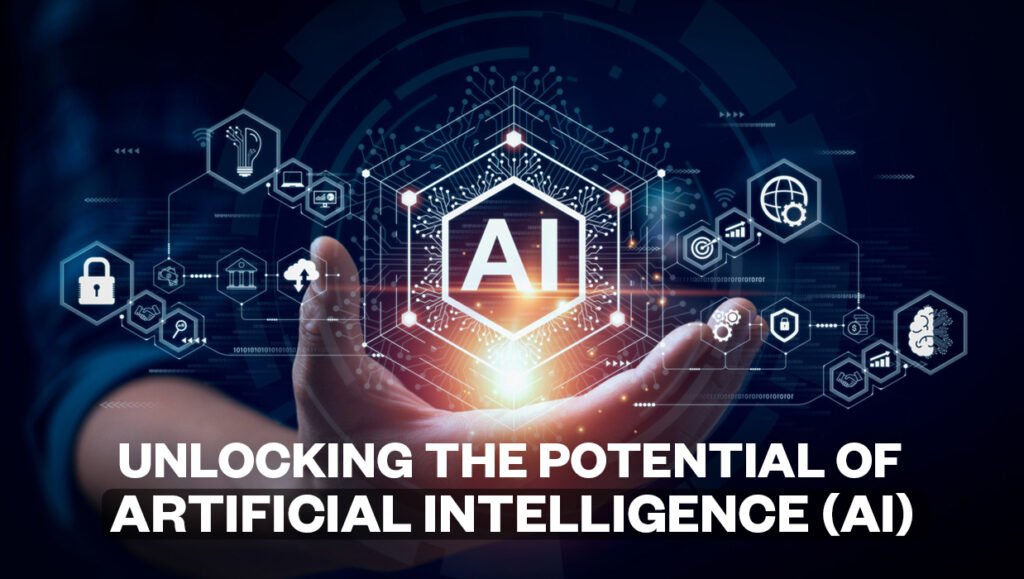Artificial Intelligence (AI) is no longer a distant dream of science fiction. It’s a powerful, rapidly evolving technology that’s transforming industries, reshaping how we live and work, and opening new frontiers of innovation. From voice assistants like Siri and Alexa to self-driving cars and personalized healthcare, AI is making its presence felt in virtually every aspect of our lives.
What is Artificial Intelligence?
At its core, Artificial Intelligence refers to the development of computer systems capable of performing tasks that would normally require human intelligence. These tasks can include understanding language, recognizing patterns, solving problems, learning from experience, and making decisions. AI is driven by advanced algorithms and vast amounts of data, allowing machines to “learn” and improve their performance over time.
There are two main types of AI: narrow AI and general AI. Narrow AI is designed for specific tasks, such as facial recognition or language translation. General AI, which is still largely theoretical, would possess the ability to understand, learn, and apply knowledge in a broad range of contexts, similar to human intelligence.
Key Applications of AI
AI has a wide range of applications across various industries. Let’s explore how it’s being utilized in some of the most impactful ways today:
1. Healthcare
In healthcare, AI is revolutionizing patient care, diagnostics, and treatment. AI-powered systems can analyze medical data at an unprecedented speed, allowing doctors to make more accurate diagnoses and identify patterns that might go unnoticed by human eyes. For example, AI algorithms are being used to detect early signs of diseases such as cancer, heart disease, and Alzheimer’s, leading to earlier interventions and improved outcomes.
Additionally, AI is being used to create personalized treatment plans based on a patient’s genetic makeup, lifestyle, and medical history. This level of precision in healthcare, known as precision medicine, is a game-changer for treating complex conditions.
2. Business and Finance
In the business world, AI is enhancing productivity, streamlining operations, and driving smarter decision-making. AI-driven analytics tools can process enormous datasets in real-time, providing businesses with valuable insights into customer behavior, market trends, and internal processes. This allows for more informed decision-making and improved efficiency.
In the finance sector, AI is being used to detect fraudulent activities, automate customer service through chatbots, and even manage investments through AI-powered trading algorithms. Robo-advisors, for example, analyze market data and make investment recommendations with minimal human intervention.
3. Autonomous Vehicles
One of the most exciting applications of AI is in the development of autonomous vehicles. Self-driving cars, powered by AI, are designed to navigate roads, detect obstacles, and make driving decisions in real-time without human input. Companies like Tesla, Waymo, and others are leading the charge in this space, and while fully autonomous cars are not yet widespread, significant progress is being made.
AI’s potential in transportation extends beyond cars. Drones, delivery robots, and even AI-powered trains are poised to reshape how we move goods and people in the future.
4. Customer Experience
AI is transforming how businesses engage with customers. AI-driven chatbots and virtual assistants are providing 24/7 customer support, helping users with everything from troubleshooting technical issues to answering product inquiries. These AI tools are becoming more sophisticated, understanding natural language and even detecting emotions to tailor responses in a human-like way.
Additionally, AI personalization engines are being used in e-commerce to recommend products, services, and content based on a user’s browsing history and preferences. This leads to more relevant, engaging experiences that drive sales and customer satisfaction.
5. Creative Industries
AI is also making waves in creative fields like art, music, and content creation. AI-powered tools can compose music, generate artwork, and even write articles or stories. For instance, platforms like OpenAI’s GPT (Generative Pretrained Transformer) are used to create human-like text, while AI algorithms can generate visuals or assist in video production.
These AI tools are not replacing human creativity but rather augmenting it, offering new possibilities for artists, writers, and creators to experiment and innovate.
The Future of Artificial Intelligence
The future of AI is incredibly bright, but it’s also filled with challenges and ethical considerations. As AI systems become more autonomous and integrated into daily life, issues such as privacy, security, and job displacement must be addressed.
One of the most significant concerns is the potential for AI to replace jobs traditionally performed by humans. Automation in industries like manufacturing, logistics, and even customer service could lead to job losses. However, AI also has the potential to create new jobs in areas like AI development, maintenance, and oversight.
Furthermore, ethical questions around AI decision-making, bias, and transparency are becoming more prominent. For example, AI systems trained on biased data can lead to unfair outcomes, especially in areas like hiring, lending, and law enforcement. Ensuring that AI systems are designed and implemented responsibly is crucial to harnessing its potential for good.
Conclusion
Artificial Intelligence is not just a technological trend; it’s a transformative force shaping the future of industries, economies, and societies. From healthcare to finance, from autonomous vehicles to creative industries, AI is unlocking new possibilities and pushing the boundaries of what machines can achieve.
As AI continues to evolve, it promises to improve efficiency, solve complex problems, and even enhance our creativity. However, it also comes with challenges that require thoughtful consideration, especially when it comes to ethical implications and its impact on jobs.
In the coming years, AI will likely become even more integrated into our daily lives, and staying informed about its developments will be key to navigating the changes it brings. As we step into this AI-powered future, one thing is certain: the potential is vast, and we’re only just beginning to explore what AI can truly achieve.
